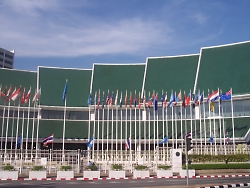Expert Group Meeting on Secure Tenure: New legal frameworks
and tools
Bangkok, 8-9 December 2005
|

The UN Conference Centre, Bangkok, Thailand, Venue of the Expert Group
Meeting |
‘Land policies are of fundamental importance to sustainable growth,
good governance, and the well-being of and the economic opportunities open
to rural and urban dwellers-particularly poor people’, according to the
recent World Bank Research Report on Land Policies for Growth and Poverty
Reduction.
In the Handbook on Best Practices, Security of Tenure and Access to Land
and the guide Pro Poor Land Management the UN/Habitat - in line with the
World Bank report- encourages innovative approaches to land management and
land administration to implement land policies. This is necessary in the
process of recognising ‘that people living in slums have a right to be in
the city, and that this recognition will begin to make slum dwellers
legitimate citizens which will start to legalize their tenure’.
Aim of the meeting
In many countries in Asia new land laws have recently become into power,
others are under development. What kind of tools do we need to adequately
support the spirit and letter of these new legal frameworks, what are
innovative ideas about information-systems and work-processes. How can we
improve existing land administration systems?
The aim of the meeting was:
- to discuss new legal frameworks for the improvement of land tenure
security and access to land related benefits
- to discuss new ideas about tools that might support the implementation
of these
- new legal frameworks
- to identify pro poor land administration approaches for both urban and
rural areas
- to discuss evolutionary approaches for recording and mapping of land
tenure forms
- to discuss possibilities to improve existing land administration
systems
- to learn from other countries that face the same challenges
- to summarize the experiences and ideas in the form of a booklet that
will be widely distributed
- to develop a research agenda for a network of research institutes in
the region
- to encourage decision makers to pay adequate attention to the
implementation aspects of land policy
The meeting
More the 50 experts from more then 20 countries were invited to join the
meeting held in the UN Conference Centre in Bangkok. 22 papers on the
subject were presented and discussed. The meeting was organised by the FIG
Commission 7 on Cadastre and Land Management, The World Bank, UN-Habitat and
the UN Economic and Social Commission for Asia and the Pacific. The meeting
was supported by the Austrian Development Agency, The Vienna Institute for
Development and Cooperation, The Netherlands Cadastre Land Registry and
Mapping Agency, The International Institute for Geo-Information Science and
earth Observation ITC and The United Nations University.
Conclusions
The chair of Commission 7, Prof Paul van der Molen observed that
benefits of land reforms can only be achieved in the context of a broader
development policy. Conventional approaches proved not to work well, only
innovative institutional arrangements can cope with increasing populations,
greater investments in land, economic growth and more social welfare. Lack
of such arrangements lead to land grabbing, conflict, resources misuse,
undermines productive and economic potential. What to do? The exclusive
focus on formal titling has proven to be inappropriate. There has to be much
greater attention to existing institutional arrangements; to stronger rights
for women, herders, indigenous people. Uncritical emphasis on land sales
markets should be avoided; rental markets provide more equity, productivity,
long term investments, if restrictions are eliminate. Land reform can only
be fully utilized if requirements and scope of intervention is carefully
compared with others and: the 'land issue' is part of a broader development
policy. Impact of al this is that innovative definitions of property rights;
simple procedures; quick, and low cost transaction mechanisms; simple, low
cost, efficient, effective, transparent and participatory systems have to be
developed. Such systems have to be free from political pressure. Important
is a low cost demarcation; availability of mechanisms for conflict
resolution and inclusion of Land Administrations as a basis for Spatial Data
Infrastructures at low cost, transparent and accessible for linking
registers of different categories and at different levels. During the
meeting many new approaches have been discussed. Some examples, among others
are; community driven adjudication (Aceh), protection of rights for
vulnerable groups (Aceh), reconstruction of land records (Aceh),
non-judicial land disputes (Cambodia), high performing teams (Cambodia), one
stop shop to test inter-organisational co-operation (Philippines), gender
mainstreaming (Philippines), high level governmental support (Philippines),
systematic titling with community involvement (Philippines), free patent
instead of homestead patent (Philippines), simple procedures (Vietnam), land
sharing possession rights (Cambodia), stewardship and guardianship are
relevant, sometimes property is not recognised (Fiji), sustainable community
lifestyle planning (Fiji), the Bhoomi approach with kiosks and self help
(India), the protection of traditional lifestyle in relation to land
(Mongolia), the 'sticker on orthophoto' approach (East Timor), etc. etc.
Customary tenure is an issue in Asia-Pacific, different groups have
different concepts of land management; it should be noticed that many
people/groups don’t have ‘spatial concepts’ related to maps.
There is a need for a wider bundle of rights, especially access rights.
‘Revenues’ should be integrated in the ‘man-land’ relationship definition,
apart from the ‘Rights’, ‘Restrictions’ and ‘Responsibilities’
Introduction of technology hampered in many cases because of resource
constraints, the question raises if paper based approaches should have
preference. In any case information contained in systems should be
reversible to paper.
A network (of networks) for pro poor land management tools has been
initiated by UN Habitat.
Van der Molen concluded that the experiences built up during this meeting
have to be published and that further analyses is required. Results of such
analyses have to be presented at the World Urban Forum to be held in
Vancouver, Canada, June 2006.
Paul van der Molen
Christiaan Lemmen
FIG Commission 7
|























